Analysis of the Global Business Environment for Unilever
VerifiedAdded on 2020/12/31
|16
|5328
|36
Report
AI Summary
This report provides a comprehensive analysis of the global business environment, focusing on the concept of globalization, its key drivers (international economic integration, foreign direct investment, international business and trade, and technological advancements), and their impact on businesses. It explores strategic challenges faced by global businesses, including supply chain complexity, cultural differences, technological changes, and international law. The report delves into the strategic challenges caused by globalization on risk, diversification strategies, and supply chain management. It examines the influences of globalization on organizational governance, structure, culture, and functions, as well as the impact of ethics. The analysis includes the application of the McKinsey 7S Model and Hofstede's Cultural Dimensions theory in the context of Unilever Plc. The report also evaluates effective decision-making in a global context and strategies for entering global markets, concluding with a discussion of key barriers to globalization and recommendations to overcome them. The report utilizes various academic sources to support its analysis.
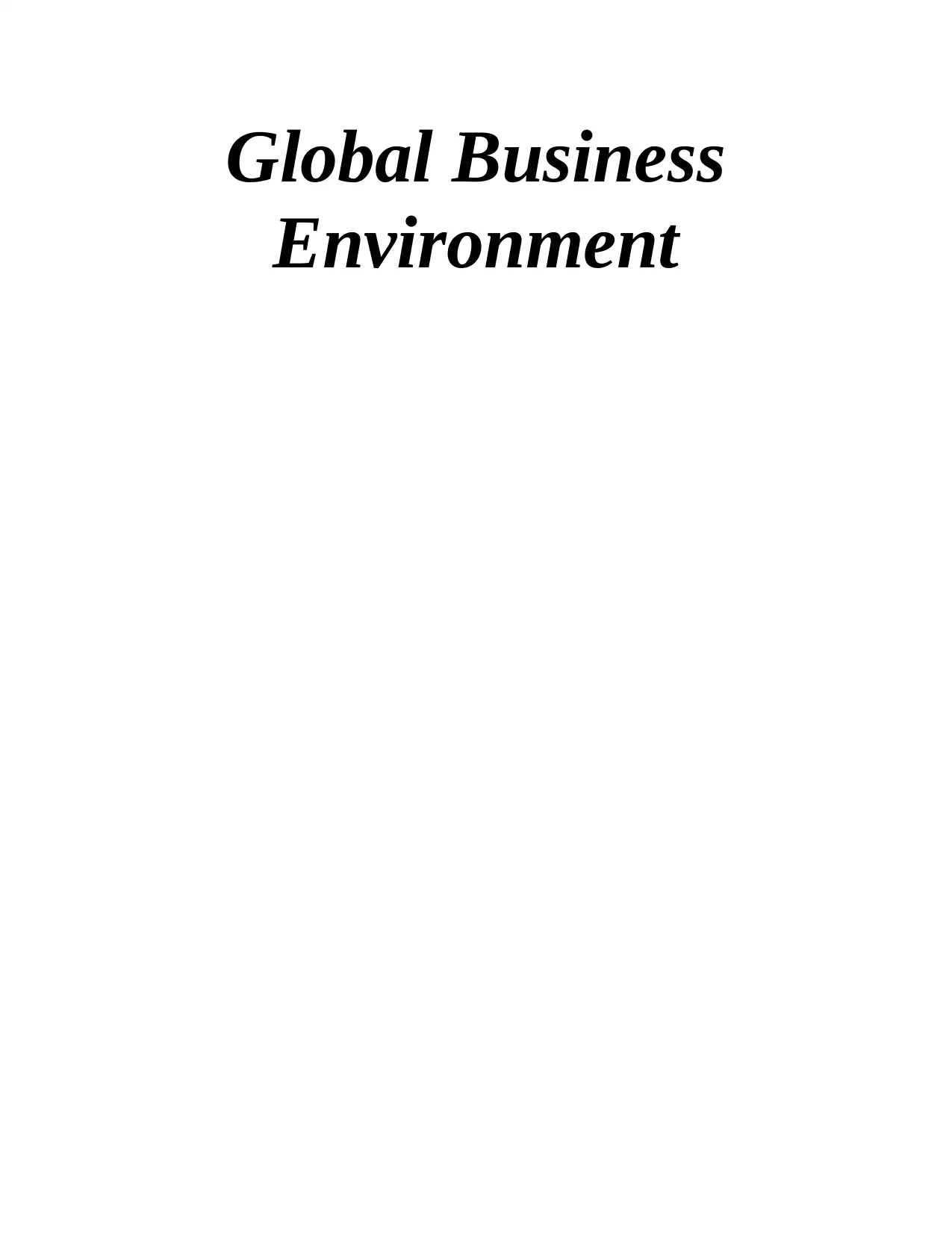
Global Business
Environment
Environment
Paraphrase This Document
Need a fresh take? Get an instant paraphrase of this document with our AI Paraphraser
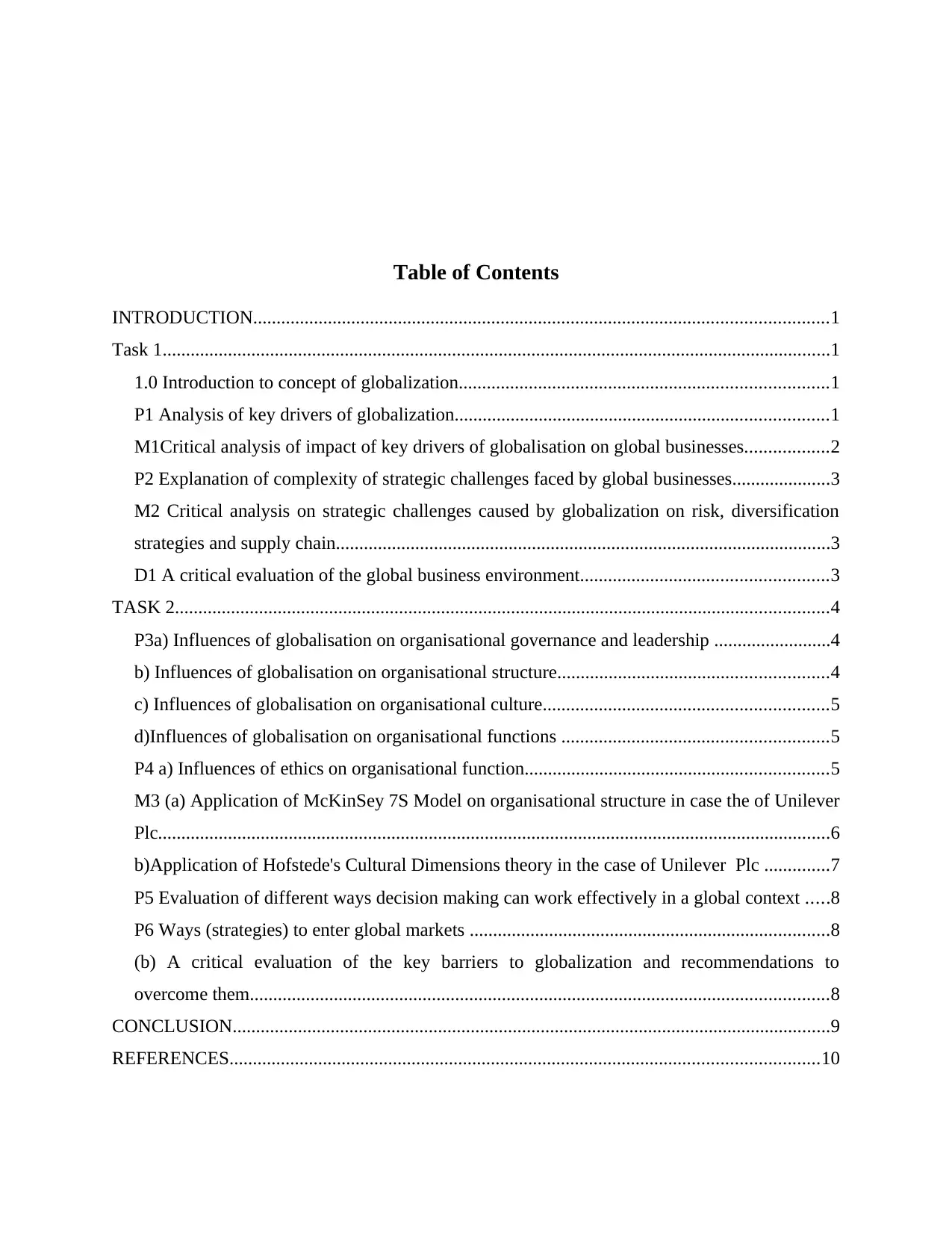
Table of Contents
INTRODUCTION...........................................................................................................................1
Task 1...............................................................................................................................................1
1.0 Introduction to concept of globalization...............................................................................1
P1 Analysis of key drivers of globalization................................................................................1
M1Critical analysis of impact of key drivers of globalisation on global businesses..................2
P2 Explanation of complexity of strategic challenges faced by global businesses.....................3
M2 Critical analysis on strategic challenges caused by globalization on risk, diversification
strategies and supply chain..........................................................................................................3
D1 A critical evaluation of the global business environment.....................................................3
TASK 2............................................................................................................................................4
P3a) Influences of globalisation on organisational governance and leadership .........................4
b) Influences of globalisation on organisational structure..........................................................4
c) Influences of globalisation on organisational culture.............................................................5
d)Influences of globalisation on organisational functions .........................................................5
P4 a) Influences of ethics on organisational function.................................................................5
M3 (a) Application of McKinSey 7S Model on organisational structure in case the of Unilever
Plc................................................................................................................................................6
b)Application of Hofstede's Cultural Dimensions theory in the case of Unilever Plc ..............7
P5 Evaluation of different ways decision making can work effectively in a global context .....8
P6 Ways (strategies) to enter global markets .............................................................................8
(b) A critical evaluation of the key barriers to globalization and recommendations to
overcome them............................................................................................................................8
CONCLUSION................................................................................................................................9
REFERENCES..............................................................................................................................10
INTRODUCTION...........................................................................................................................1
Task 1...............................................................................................................................................1
1.0 Introduction to concept of globalization...............................................................................1
P1 Analysis of key drivers of globalization................................................................................1
M1Critical analysis of impact of key drivers of globalisation on global businesses..................2
P2 Explanation of complexity of strategic challenges faced by global businesses.....................3
M2 Critical analysis on strategic challenges caused by globalization on risk, diversification
strategies and supply chain..........................................................................................................3
D1 A critical evaluation of the global business environment.....................................................3
TASK 2............................................................................................................................................4
P3a) Influences of globalisation on organisational governance and leadership .........................4
b) Influences of globalisation on organisational structure..........................................................4
c) Influences of globalisation on organisational culture.............................................................5
d)Influences of globalisation on organisational functions .........................................................5
P4 a) Influences of ethics on organisational function.................................................................5
M3 (a) Application of McKinSey 7S Model on organisational structure in case the of Unilever
Plc................................................................................................................................................6
b)Application of Hofstede's Cultural Dimensions theory in the case of Unilever Plc ..............7
P5 Evaluation of different ways decision making can work effectively in a global context .....8
P6 Ways (strategies) to enter global markets .............................................................................8
(b) A critical evaluation of the key barriers to globalization and recommendations to
overcome them............................................................................................................................8
CONCLUSION................................................................................................................................9
REFERENCES..............................................................................................................................10

⊘ This is a preview!⊘
Do you want full access?
Subscribe today to unlock all pages.

Trusted by 1+ million students worldwide
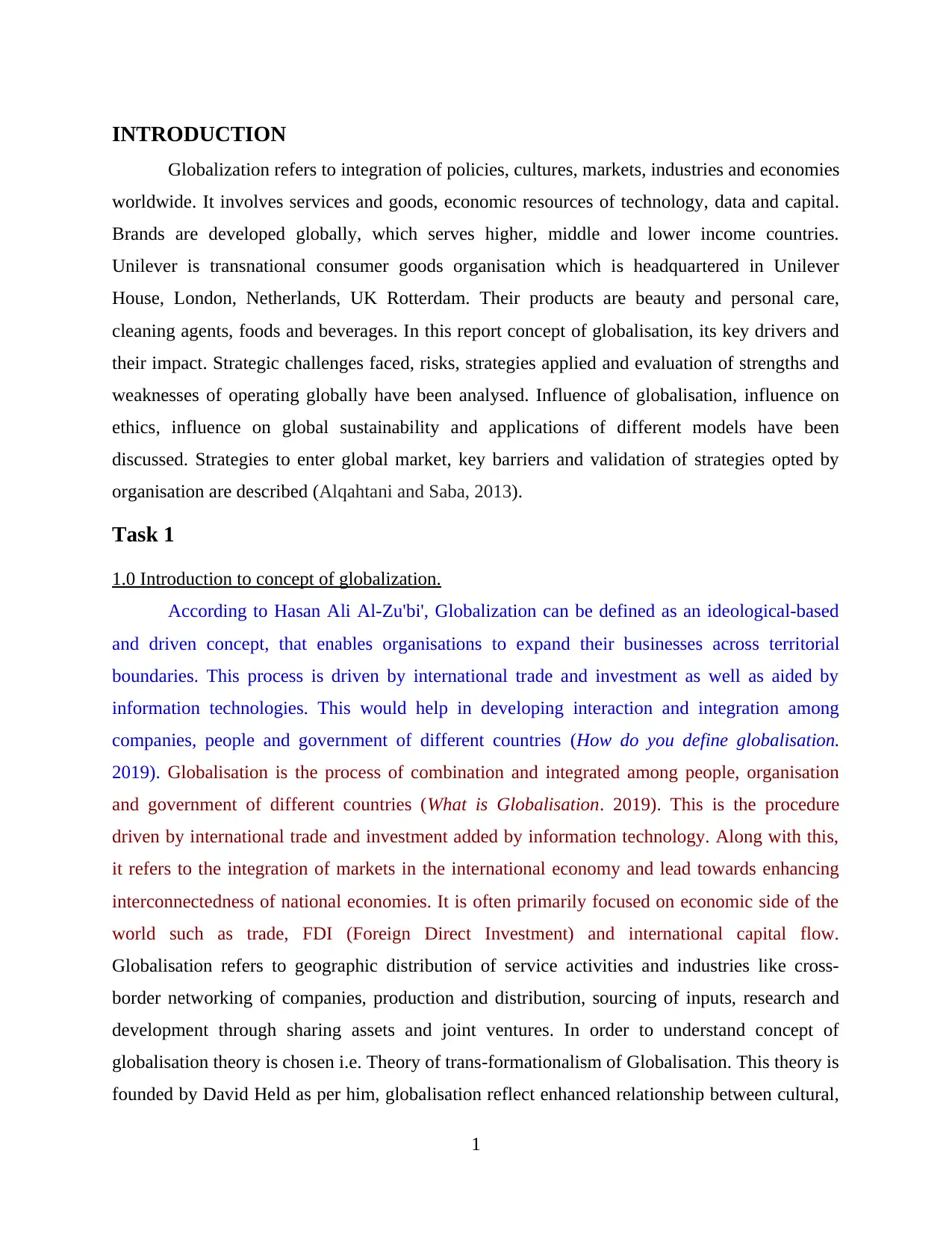
INTRODUCTION
Globalization refers to integration of policies, cultures, markets, industries and economies
worldwide. It involves services and goods, economic resources of technology, data and capital.
Brands are developed globally, which serves higher, middle and lower income countries.
Unilever is transnational consumer goods organisation which is headquartered in Unilever
House, London, Netherlands, UK Rotterdam. Their products are beauty and personal care,
cleaning agents, foods and beverages. In this report concept of globalisation, its key drivers and
their impact. Strategic challenges faced, risks, strategies applied and evaluation of strengths and
weaknesses of operating globally have been analysed. Influence of globalisation, influence on
ethics, influence on global sustainability and applications of different models have been
discussed. Strategies to enter global market, key barriers and validation of strategies opted by
organisation are described (Alqahtani and Saba, 2013).
Task 1
1.0 Introduction to concept of globalization.
According to Hasan Ali Al-Zu'bi', Globalization can be defined as an ideological-based
and driven concept, that enables organisations to expand their businesses across territorial
boundaries. This process is driven by international trade and investment as well as aided by
information technologies. This would help in developing interaction and integration among
companies, people and government of different countries (How do you define globalisation.
2019). Globalisation is the process of combination and integrated among people, organisation
and government of different countries (What is Globalisation. 2019). This is the procedure
driven by international trade and investment added by information technology. Along with this,
it refers to the integration of markets in the international economy and lead towards enhancing
interconnectedness of national economies. It is often primarily focused on economic side of the
world such as trade, FDI (Foreign Direct Investment) and international capital flow.
Globalisation refers to geographic distribution of service activities and industries like cross-
border networking of companies, production and distribution, sourcing of inputs, research and
development through sharing assets and joint ventures. In order to understand concept of
globalisation theory is chosen i.e. Theory of trans-formationalism of Globalisation. This theory is
founded by David Held as per him, globalisation reflect enhanced relationship between cultural,
1
Globalization refers to integration of policies, cultures, markets, industries and economies
worldwide. It involves services and goods, economic resources of technology, data and capital.
Brands are developed globally, which serves higher, middle and lower income countries.
Unilever is transnational consumer goods organisation which is headquartered in Unilever
House, London, Netherlands, UK Rotterdam. Their products are beauty and personal care,
cleaning agents, foods and beverages. In this report concept of globalisation, its key drivers and
their impact. Strategic challenges faced, risks, strategies applied and evaluation of strengths and
weaknesses of operating globally have been analysed. Influence of globalisation, influence on
ethics, influence on global sustainability and applications of different models have been
discussed. Strategies to enter global market, key barriers and validation of strategies opted by
organisation are described (Alqahtani and Saba, 2013).
Task 1
1.0 Introduction to concept of globalization.
According to Hasan Ali Al-Zu'bi', Globalization can be defined as an ideological-based
and driven concept, that enables organisations to expand their businesses across territorial
boundaries. This process is driven by international trade and investment as well as aided by
information technologies. This would help in developing interaction and integration among
companies, people and government of different countries (How do you define globalisation.
2019). Globalisation is the process of combination and integrated among people, organisation
and government of different countries (What is Globalisation. 2019). This is the procedure
driven by international trade and investment added by information technology. Along with this,
it refers to the integration of markets in the international economy and lead towards enhancing
interconnectedness of national economies. It is often primarily focused on economic side of the
world such as trade, FDI (Foreign Direct Investment) and international capital flow.
Globalisation refers to geographic distribution of service activities and industries like cross-
border networking of companies, production and distribution, sourcing of inputs, research and
development through sharing assets and joint ventures. In order to understand concept of
globalisation theory is chosen i.e. Theory of trans-formationalism of Globalisation. This theory is
founded by David Held as per him, globalisation reflect enhanced relationship between cultural,
1
Paraphrase This Document
Need a fresh take? Get an instant paraphrase of this document with our AI Paraphraser
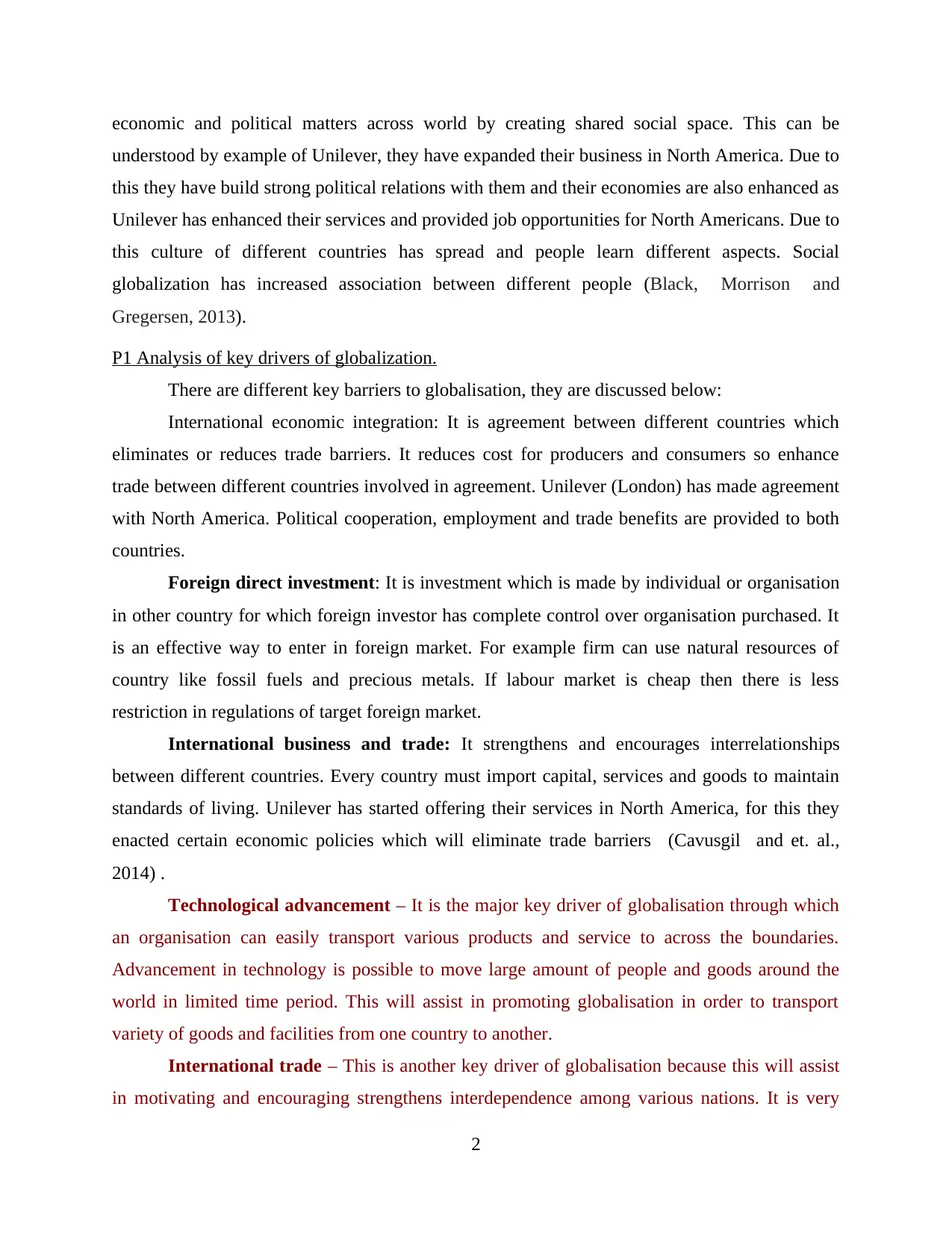
economic and political matters across world by creating shared social space. This can be
understood by example of Unilever, they have expanded their business in North America. Due to
this they have build strong political relations with them and their economies are also enhanced as
Unilever has enhanced their services and provided job opportunities for North Americans. Due to
this culture of different countries has spread and people learn different aspects. Social
globalization has increased association between different people (Black, Morrison and
Gregersen, 2013).
P1 Analysis of key drivers of globalization.
There are different key barriers to globalisation, they are discussed below:
International economic integration: It is agreement between different countries which
eliminates or reduces trade barriers. It reduces cost for producers and consumers so enhance
trade between different countries involved in agreement. Unilever (London) has made agreement
with North America. Political cooperation, employment and trade benefits are provided to both
countries.
Foreign direct investment: It is investment which is made by individual or organisation
in other country for which foreign investor has complete control over organisation purchased. It
is an effective way to enter in foreign market. For example firm can use natural resources of
country like fossil fuels and precious metals. If labour market is cheap then there is less
restriction in regulations of target foreign market.
International business and trade: It strengthens and encourages interrelationships
between different countries. Every country must import capital, services and goods to maintain
standards of living. Unilever has started offering their services in North America, for this they
enacted certain economic policies which will eliminate trade barriers (Cavusgil and et. al.,
2014) .
Technological advancement – It is the major key driver of globalisation through which
an organisation can easily transport various products and service to across the boundaries.
Advancement in technology is possible to move large amount of people and goods around the
world in limited time period. This will assist in promoting globalisation in order to transport
variety of goods and facilities from one country to another.
International trade – This is another key driver of globalisation because this will assist
in motivating and encouraging strengthens interdependence among various nations. It is very
2
understood by example of Unilever, they have expanded their business in North America. Due to
this they have build strong political relations with them and their economies are also enhanced as
Unilever has enhanced their services and provided job opportunities for North Americans. Due to
this culture of different countries has spread and people learn different aspects. Social
globalization has increased association between different people (Black, Morrison and
Gregersen, 2013).
P1 Analysis of key drivers of globalization.
There are different key barriers to globalisation, they are discussed below:
International economic integration: It is agreement between different countries which
eliminates or reduces trade barriers. It reduces cost for producers and consumers so enhance
trade between different countries involved in agreement. Unilever (London) has made agreement
with North America. Political cooperation, employment and trade benefits are provided to both
countries.
Foreign direct investment: It is investment which is made by individual or organisation
in other country for which foreign investor has complete control over organisation purchased. It
is an effective way to enter in foreign market. For example firm can use natural resources of
country like fossil fuels and precious metals. If labour market is cheap then there is less
restriction in regulations of target foreign market.
International business and trade: It strengthens and encourages interrelationships
between different countries. Every country must import capital, services and goods to maintain
standards of living. Unilever has started offering their services in North America, for this they
enacted certain economic policies which will eliminate trade barriers (Cavusgil and et. al.,
2014) .
Technological advancement – It is the major key driver of globalisation through which
an organisation can easily transport various products and service to across the boundaries.
Advancement in technology is possible to move large amount of people and goods around the
world in limited time period. This will assist in promoting globalisation in order to transport
variety of goods and facilities from one country to another.
International trade – This is another key driver of globalisation because this will assist
in motivating and encouraging strengthens interdependence among various nations. It is very
2
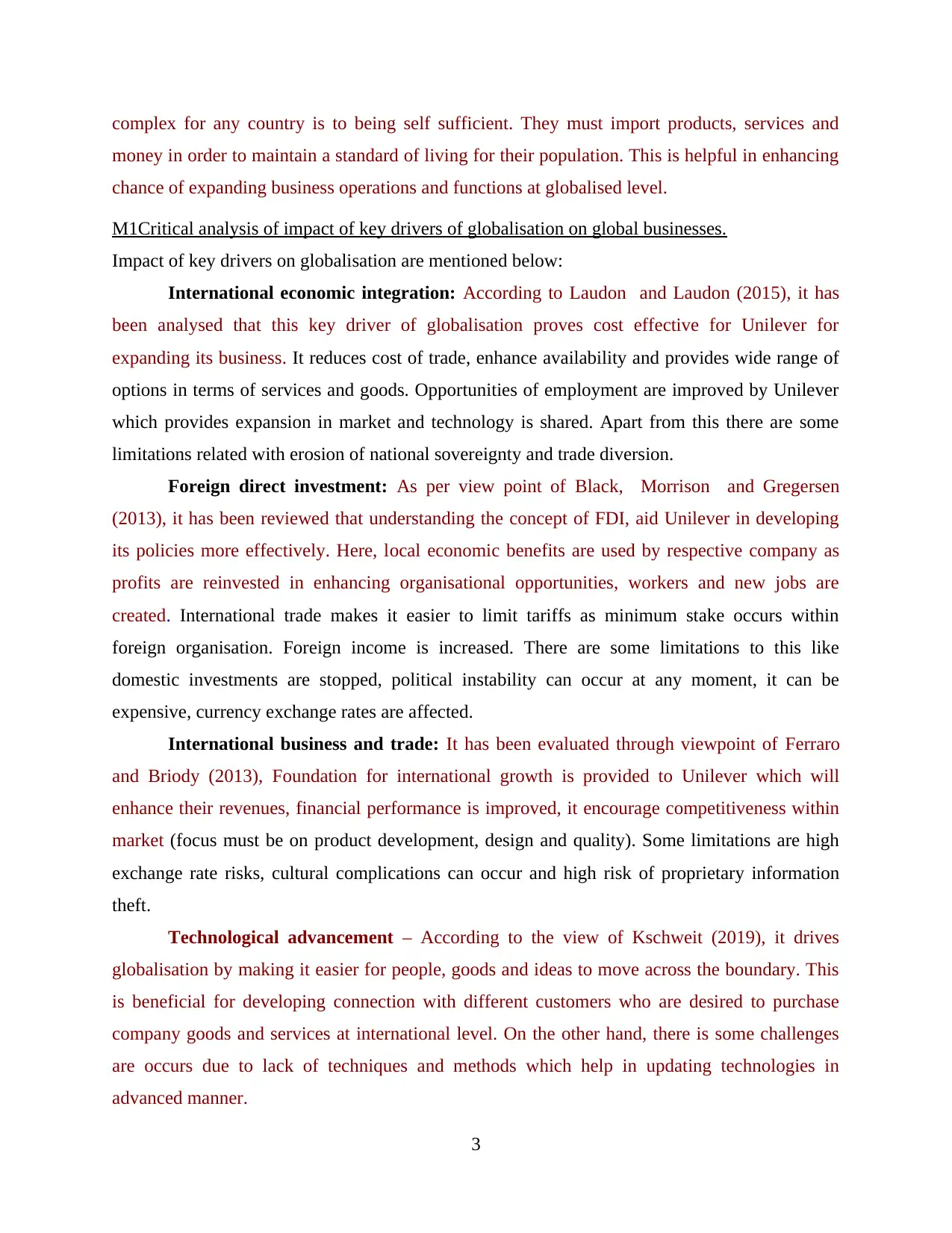
complex for any country is to being self sufficient. They must import products, services and
money in order to maintain a standard of living for their population. This is helpful in enhancing
chance of expanding business operations and functions at globalised level.
M1Critical analysis of impact of key drivers of globalisation on global businesses.
Impact of key drivers on globalisation are mentioned below:
International economic integration: According to Laudon and Laudon (2015), it has
been analysed that this key driver of globalisation proves cost effective for Unilever for
expanding its business. It reduces cost of trade, enhance availability and provides wide range of
options in terms of services and goods. Opportunities of employment are improved by Unilever
which provides expansion in market and technology is shared. Apart from this there are some
limitations related with erosion of national sovereignty and trade diversion.
Foreign direct investment: As per view point of Black, Morrison and Gregersen
(2013), it has been reviewed that understanding the concept of FDI, aid Unilever in developing
its policies more effectively. Here, local economic benefits are used by respective company as
profits are reinvested in enhancing organisational opportunities, workers and new jobs are
created. International trade makes it easier to limit tariffs as minimum stake occurs within
foreign organisation. Foreign income is increased. There are some limitations to this like
domestic investments are stopped, political instability can occur at any moment, it can be
expensive, currency exchange rates are affected.
International business and trade: It has been evaluated through viewpoint of Ferraro
and Briody (2013), Foundation for international growth is provided to Unilever which will
enhance their revenues, financial performance is improved, it encourage competitiveness within
market (focus must be on product development, design and quality). Some limitations are high
exchange rate risks, cultural complications can occur and high risk of proprietary information
theft.
Technological advancement – According to the view of Kschweit (2019), it drives
globalisation by making it easier for people, goods and ideas to move across the boundary. This
is beneficial for developing connection with different customers who are desired to purchase
company goods and services at international level. On the other hand, there is some challenges
are occurs due to lack of techniques and methods which help in updating technologies in
advanced manner.
3
money in order to maintain a standard of living for their population. This is helpful in enhancing
chance of expanding business operations and functions at globalised level.
M1Critical analysis of impact of key drivers of globalisation on global businesses.
Impact of key drivers on globalisation are mentioned below:
International economic integration: According to Laudon and Laudon (2015), it has
been analysed that this key driver of globalisation proves cost effective for Unilever for
expanding its business. It reduces cost of trade, enhance availability and provides wide range of
options in terms of services and goods. Opportunities of employment are improved by Unilever
which provides expansion in market and technology is shared. Apart from this there are some
limitations related with erosion of national sovereignty and trade diversion.
Foreign direct investment: As per view point of Black, Morrison and Gregersen
(2013), it has been reviewed that understanding the concept of FDI, aid Unilever in developing
its policies more effectively. Here, local economic benefits are used by respective company as
profits are reinvested in enhancing organisational opportunities, workers and new jobs are
created. International trade makes it easier to limit tariffs as minimum stake occurs within
foreign organisation. Foreign income is increased. There are some limitations to this like
domestic investments are stopped, political instability can occur at any moment, it can be
expensive, currency exchange rates are affected.
International business and trade: It has been evaluated through viewpoint of Ferraro
and Briody (2013), Foundation for international growth is provided to Unilever which will
enhance their revenues, financial performance is improved, it encourage competitiveness within
market (focus must be on product development, design and quality). Some limitations are high
exchange rate risks, cultural complications can occur and high risk of proprietary information
theft.
Technological advancement – According to the view of Kschweit (2019), it drives
globalisation by making it easier for people, goods and ideas to move across the boundary. This
is beneficial for developing connection with different customers who are desired to purchase
company goods and services at international level. On the other hand, there is some challenges
are occurs due to lack of techniques and methods which help in updating technologies in
advanced manner.
3
⊘ This is a preview!⊘
Do you want full access?
Subscribe today to unlock all pages.

Trusted by 1+ million students worldwide
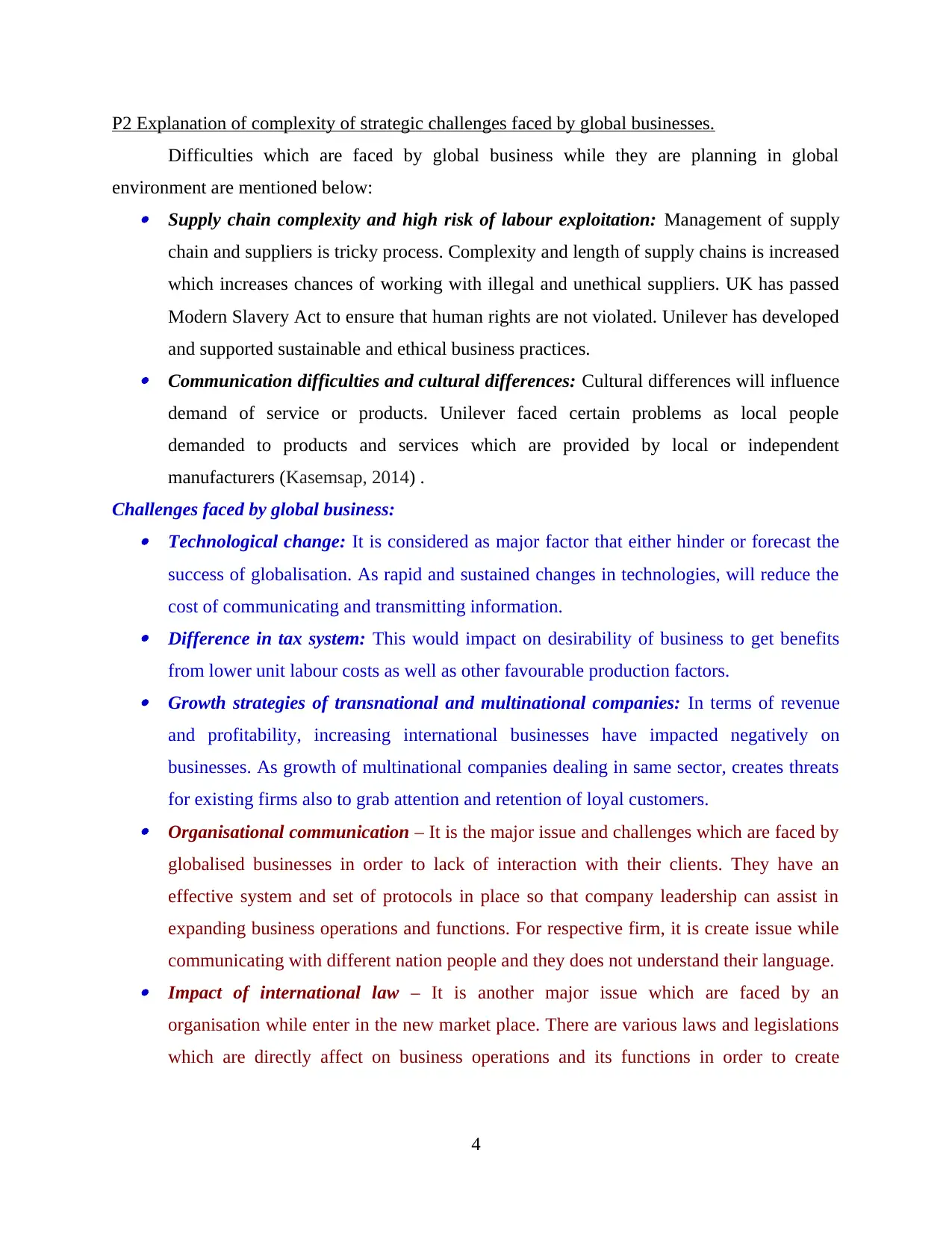
P2 Explanation of complexity of strategic challenges faced by global businesses.
Difficulties which are faced by global business while they are planning in global
environment are mentioned below: Supply chain complexity and high risk of labour exploitation: Management of supply
chain and suppliers is tricky process. Complexity and length of supply chains is increased
which increases chances of working with illegal and unethical suppliers. UK has passed
Modern Slavery Act to ensure that human rights are not violated. Unilever has developed
and supported sustainable and ethical business practices. Communication difficulties and cultural differences: Cultural differences will influence
demand of service or products. Unilever faced certain problems as local people
demanded to products and services which are provided by local or independent
manufacturers (Kasemsap, 2014) .
Challenges faced by global business: Technological change: It is considered as major factor that either hinder or forecast the
success of globalisation. As rapid and sustained changes in technologies, will reduce the
cost of communicating and transmitting information. Difference in tax system: This would impact on desirability of business to get benefits
from lower unit labour costs as well as other favourable production factors. Growth strategies of transnational and multinational companies: In terms of revenue
and profitability, increasing international businesses have impacted negatively on
businesses. As growth of multinational companies dealing in same sector, creates threats
for existing firms also to grab attention and retention of loyal customers. Organisational communication – It is the major issue and challenges which are faced by
globalised businesses in order to lack of interaction with their clients. They have an
effective system and set of protocols in place so that company leadership can assist in
expanding business operations and functions. For respective firm, it is create issue while
communicating with different nation people and they does not understand their language. Impact of international law – It is another major issue which are faced by an
organisation while enter in the new market place. There are various laws and legislations
which are directly affect on business operations and its functions in order to create
4
Difficulties which are faced by global business while they are planning in global
environment are mentioned below: Supply chain complexity and high risk of labour exploitation: Management of supply
chain and suppliers is tricky process. Complexity and length of supply chains is increased
which increases chances of working with illegal and unethical suppliers. UK has passed
Modern Slavery Act to ensure that human rights are not violated. Unilever has developed
and supported sustainable and ethical business practices. Communication difficulties and cultural differences: Cultural differences will influence
demand of service or products. Unilever faced certain problems as local people
demanded to products and services which are provided by local or independent
manufacturers (Kasemsap, 2014) .
Challenges faced by global business: Technological change: It is considered as major factor that either hinder or forecast the
success of globalisation. As rapid and sustained changes in technologies, will reduce the
cost of communicating and transmitting information. Difference in tax system: This would impact on desirability of business to get benefits
from lower unit labour costs as well as other favourable production factors. Growth strategies of transnational and multinational companies: In terms of revenue
and profitability, increasing international businesses have impacted negatively on
businesses. As growth of multinational companies dealing in same sector, creates threats
for existing firms also to grab attention and retention of loyal customers. Organisational communication – It is the major issue and challenges which are faced by
globalised businesses in order to lack of interaction with their clients. They have an
effective system and set of protocols in place so that company leadership can assist in
expanding business operations and functions. For respective firm, it is create issue while
communicating with different nation people and they does not understand their language. Impact of international law – It is another major issue which are faced by an
organisation while enter in the new market place. There are various laws and legislations
which are directly affect on business operations and its functions in order to create
4
Paraphrase This Document
Need a fresh take? Get an instant paraphrase of this document with our AI Paraphraser
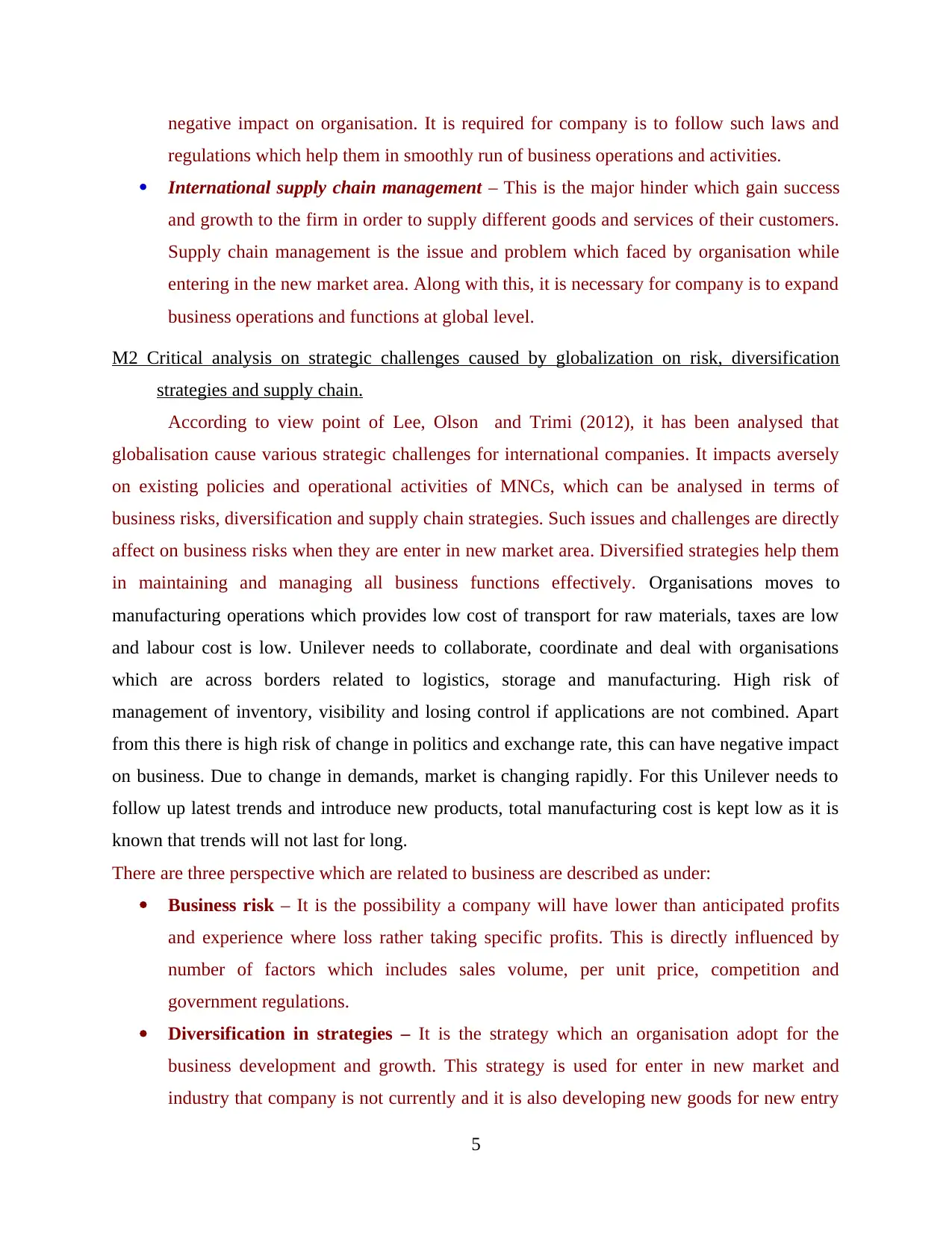
negative impact on organisation. It is required for company is to follow such laws and
regulations which help them in smoothly run of business operations and activities.
International supply chain management – This is the major hinder which gain success
and growth to the firm in order to supply different goods and services of their customers.
Supply chain management is the issue and problem which faced by organisation while
entering in the new market area. Along with this, it is necessary for company is to expand
business operations and functions at global level.
M2 Critical analysis on strategic challenges caused by globalization on risk, diversification
strategies and supply chain.
According to view point of Lee, Olson and Trimi (2012), it has been analysed that
globalisation cause various strategic challenges for international companies. It impacts aversely
on existing policies and operational activities of MNCs, which can be analysed in terms of
business risks, diversification and supply chain strategies. Such issues and challenges are directly
affect on business risks when they are enter in new market area. Diversified strategies help them
in maintaining and managing all business functions effectively. Organisations moves to
manufacturing operations which provides low cost of transport for raw materials, taxes are low
and labour cost is low. Unilever needs to collaborate, coordinate and deal with organisations
which are across borders related to logistics, storage and manufacturing. High risk of
management of inventory, visibility and losing control if applications are not combined. Apart
from this there is high risk of change in politics and exchange rate, this can have negative impact
on business. Due to change in demands, market is changing rapidly. For this Unilever needs to
follow up latest trends and introduce new products, total manufacturing cost is kept low as it is
known that trends will not last for long.
There are three perspective which are related to business are described as under:
Business risk – It is the possibility a company will have lower than anticipated profits
and experience where loss rather taking specific profits. This is directly influenced by
number of factors which includes sales volume, per unit price, competition and
government regulations.
Diversification in strategies – It is the strategy which an organisation adopt for the
business development and growth. This strategy is used for enter in new market and
industry that company is not currently and it is also developing new goods for new entry
5
regulations which help them in smoothly run of business operations and activities.
International supply chain management – This is the major hinder which gain success
and growth to the firm in order to supply different goods and services of their customers.
Supply chain management is the issue and problem which faced by organisation while
entering in the new market area. Along with this, it is necessary for company is to expand
business operations and functions at global level.
M2 Critical analysis on strategic challenges caused by globalization on risk, diversification
strategies and supply chain.
According to view point of Lee, Olson and Trimi (2012), it has been analysed that
globalisation cause various strategic challenges for international companies. It impacts aversely
on existing policies and operational activities of MNCs, which can be analysed in terms of
business risks, diversification and supply chain strategies. Such issues and challenges are directly
affect on business risks when they are enter in new market area. Diversified strategies help them
in maintaining and managing all business functions effectively. Organisations moves to
manufacturing operations which provides low cost of transport for raw materials, taxes are low
and labour cost is low. Unilever needs to collaborate, coordinate and deal with organisations
which are across borders related to logistics, storage and manufacturing. High risk of
management of inventory, visibility and losing control if applications are not combined. Apart
from this there is high risk of change in politics and exchange rate, this can have negative impact
on business. Due to change in demands, market is changing rapidly. For this Unilever needs to
follow up latest trends and introduce new products, total manufacturing cost is kept low as it is
known that trends will not last for long.
There are three perspective which are related to business are described as under:
Business risk – It is the possibility a company will have lower than anticipated profits
and experience where loss rather taking specific profits. This is directly influenced by
number of factors which includes sales volume, per unit price, competition and
government regulations.
Diversification in strategies – It is the strategy which an organisation adopt for the
business development and growth. This strategy is used for enter in new market and
industry that company is not currently and it is also developing new goods for new entry
5
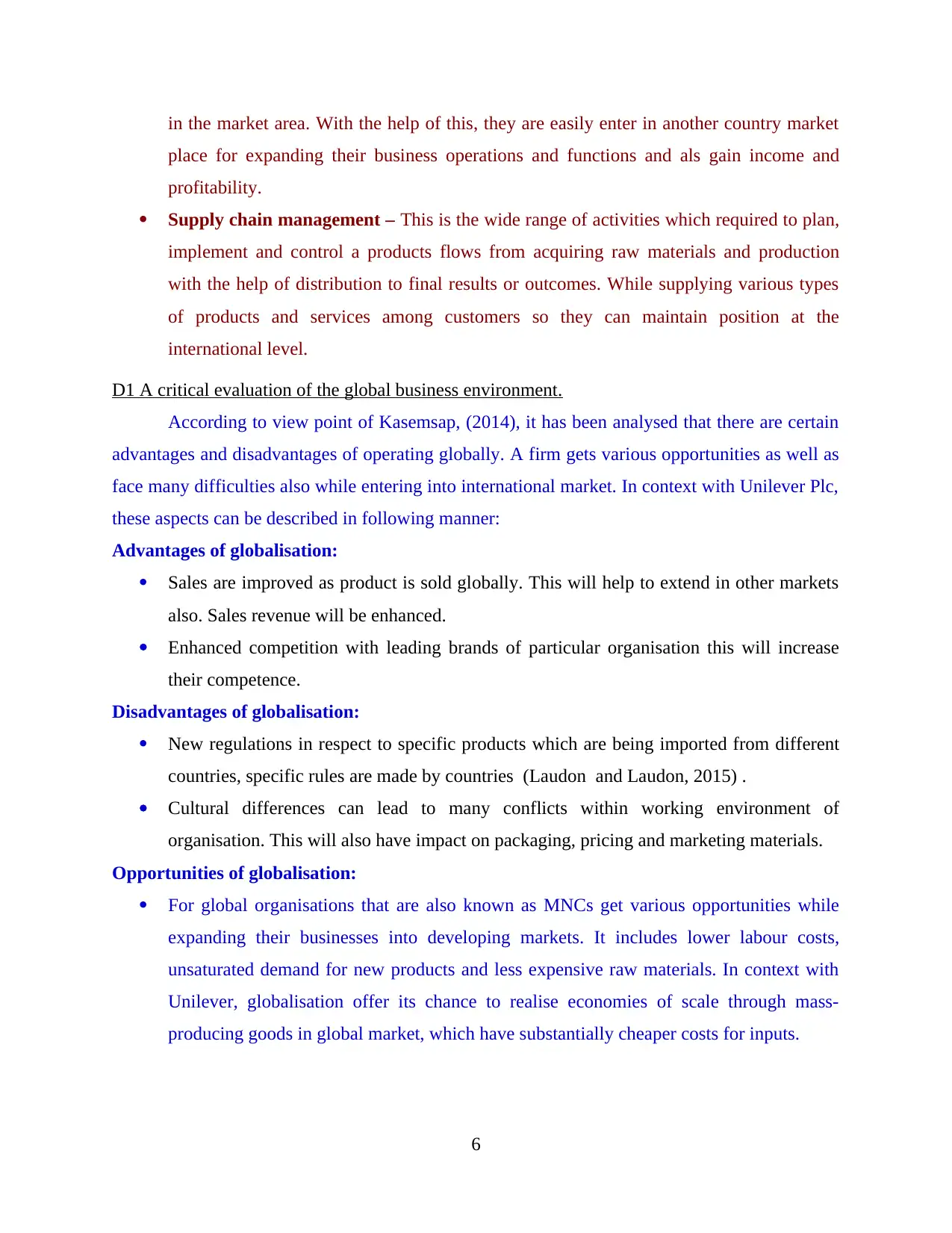
in the market area. With the help of this, they are easily enter in another country market
place for expanding their business operations and functions and als gain income and
profitability.
Supply chain management – This is the wide range of activities which required to plan,
implement and control a products flows from acquiring raw materials and production
with the help of distribution to final results or outcomes. While supplying various types
of products and services among customers so they can maintain position at the
international level.
D1 A critical evaluation of the global business environment.
According to view point of Kasemsap, (2014), it has been analysed that there are certain
advantages and disadvantages of operating globally. A firm gets various opportunities as well as
face many difficulties also while entering into international market. In context with Unilever Plc,
these aspects can be described in following manner:
Advantages of globalisation:
Sales are improved as product is sold globally. This will help to extend in other markets
also. Sales revenue will be enhanced.
Enhanced competition with leading brands of particular organisation this will increase
their competence.
Disadvantages of globalisation:
New regulations in respect to specific products which are being imported from different
countries, specific rules are made by countries (Laudon and Laudon, 2015) .
Cultural differences can lead to many conflicts within working environment of
organisation. This will also have impact on packaging, pricing and marketing materials.
Opportunities of globalisation:
For global organisations that are also known as MNCs get various opportunities while
expanding their businesses into developing markets. It includes lower labour costs,
unsaturated demand for new products and less expensive raw materials. In context with
Unilever, globalisation offer its chance to realise economies of scale through mass-
producing goods in global market, which have substantially cheaper costs for inputs.
6
place for expanding their business operations and functions and als gain income and
profitability.
Supply chain management – This is the wide range of activities which required to plan,
implement and control a products flows from acquiring raw materials and production
with the help of distribution to final results or outcomes. While supplying various types
of products and services among customers so they can maintain position at the
international level.
D1 A critical evaluation of the global business environment.
According to view point of Kasemsap, (2014), it has been analysed that there are certain
advantages and disadvantages of operating globally. A firm gets various opportunities as well as
face many difficulties also while entering into international market. In context with Unilever Plc,
these aspects can be described in following manner:
Advantages of globalisation:
Sales are improved as product is sold globally. This will help to extend in other markets
also. Sales revenue will be enhanced.
Enhanced competition with leading brands of particular organisation this will increase
their competence.
Disadvantages of globalisation:
New regulations in respect to specific products which are being imported from different
countries, specific rules are made by countries (Laudon and Laudon, 2015) .
Cultural differences can lead to many conflicts within working environment of
organisation. This will also have impact on packaging, pricing and marketing materials.
Opportunities of globalisation:
For global organisations that are also known as MNCs get various opportunities while
expanding their businesses into developing markets. It includes lower labour costs,
unsaturated demand for new products and less expensive raw materials. In context with
Unilever, globalisation offer its chance to realise economies of scale through mass-
producing goods in global market, which have substantially cheaper costs for inputs.
6
⊘ This is a preview!⊘
Do you want full access?
Subscribe today to unlock all pages.

Trusted by 1+ million students worldwide
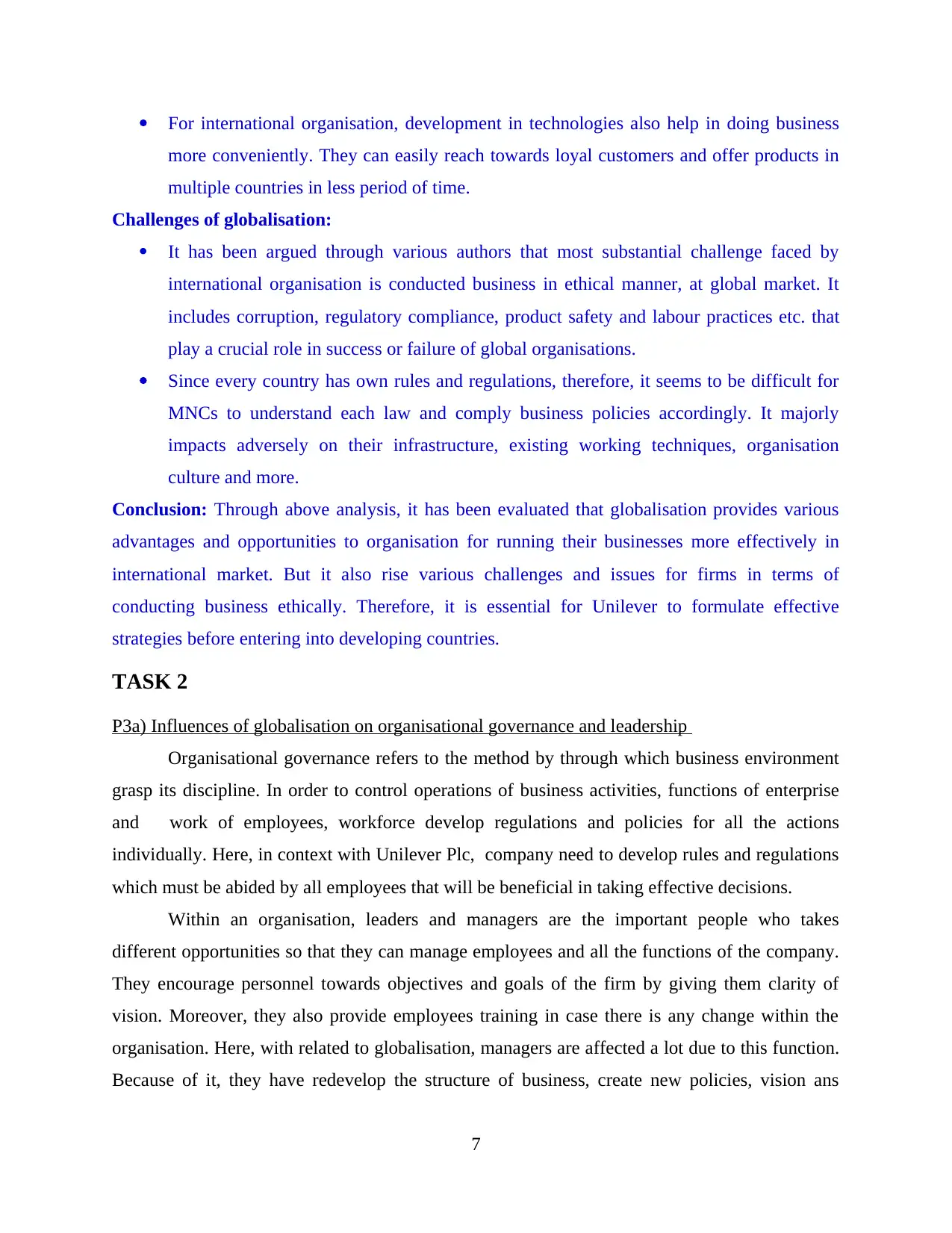
For international organisation, development in technologies also help in doing business
more conveniently. They can easily reach towards loyal customers and offer products in
multiple countries in less period of time.
Challenges of globalisation:
It has been argued through various authors that most substantial challenge faced by
international organisation is conducted business in ethical manner, at global market. It
includes corruption, regulatory compliance, product safety and labour practices etc. that
play a crucial role in success or failure of global organisations.
Since every country has own rules and regulations, therefore, it seems to be difficult for
MNCs to understand each law and comply business policies accordingly. It majorly
impacts adversely on their infrastructure, existing working techniques, organisation
culture and more.
Conclusion: Through above analysis, it has been evaluated that globalisation provides various
advantages and opportunities to organisation for running their businesses more effectively in
international market. But it also rise various challenges and issues for firms in terms of
conducting business ethically. Therefore, it is essential for Unilever to formulate effective
strategies before entering into developing countries.
TASK 2
P3a) Influences of globalisation on organisational governance and leadership
Organisational governance refers to the method by through which business environment
grasp its discipline. In order to control operations of business activities, functions of enterprise
and work of employees, workforce develop regulations and policies for all the actions
individually. Here, in context with Unilever Plc, company need to develop rules and regulations
which must be abided by all employees that will be beneficial in taking effective decisions.
Within an organisation, leaders and managers are the important people who takes
different opportunities so that they can manage employees and all the functions of the company.
They encourage personnel towards objectives and goals of the firm by giving them clarity of
vision. Moreover, they also provide employees training in case there is any change within the
organisation. Here, with related to globalisation, managers are affected a lot due to this function.
Because of it, they have redevelop the structure of business, create new policies, vision ans
7
more conveniently. They can easily reach towards loyal customers and offer products in
multiple countries in less period of time.
Challenges of globalisation:
It has been argued through various authors that most substantial challenge faced by
international organisation is conducted business in ethical manner, at global market. It
includes corruption, regulatory compliance, product safety and labour practices etc. that
play a crucial role in success or failure of global organisations.
Since every country has own rules and regulations, therefore, it seems to be difficult for
MNCs to understand each law and comply business policies accordingly. It majorly
impacts adversely on their infrastructure, existing working techniques, organisation
culture and more.
Conclusion: Through above analysis, it has been evaluated that globalisation provides various
advantages and opportunities to organisation for running their businesses more effectively in
international market. But it also rise various challenges and issues for firms in terms of
conducting business ethically. Therefore, it is essential for Unilever to formulate effective
strategies before entering into developing countries.
TASK 2
P3a) Influences of globalisation on organisational governance and leadership
Organisational governance refers to the method by through which business environment
grasp its discipline. In order to control operations of business activities, functions of enterprise
and work of employees, workforce develop regulations and policies for all the actions
individually. Here, in context with Unilever Plc, company need to develop rules and regulations
which must be abided by all employees that will be beneficial in taking effective decisions.
Within an organisation, leaders and managers are the important people who takes
different opportunities so that they can manage employees and all the functions of the company.
They encourage personnel towards objectives and goals of the firm by giving them clarity of
vision. Moreover, they also provide employees training in case there is any change within the
organisation. Here, with related to globalisation, managers are affected a lot due to this function.
Because of it, they have redevelop the structure of business, create new policies, vision ans
7
Paraphrase This Document
Need a fresh take? Get an instant paraphrase of this document with our AI Paraphraser
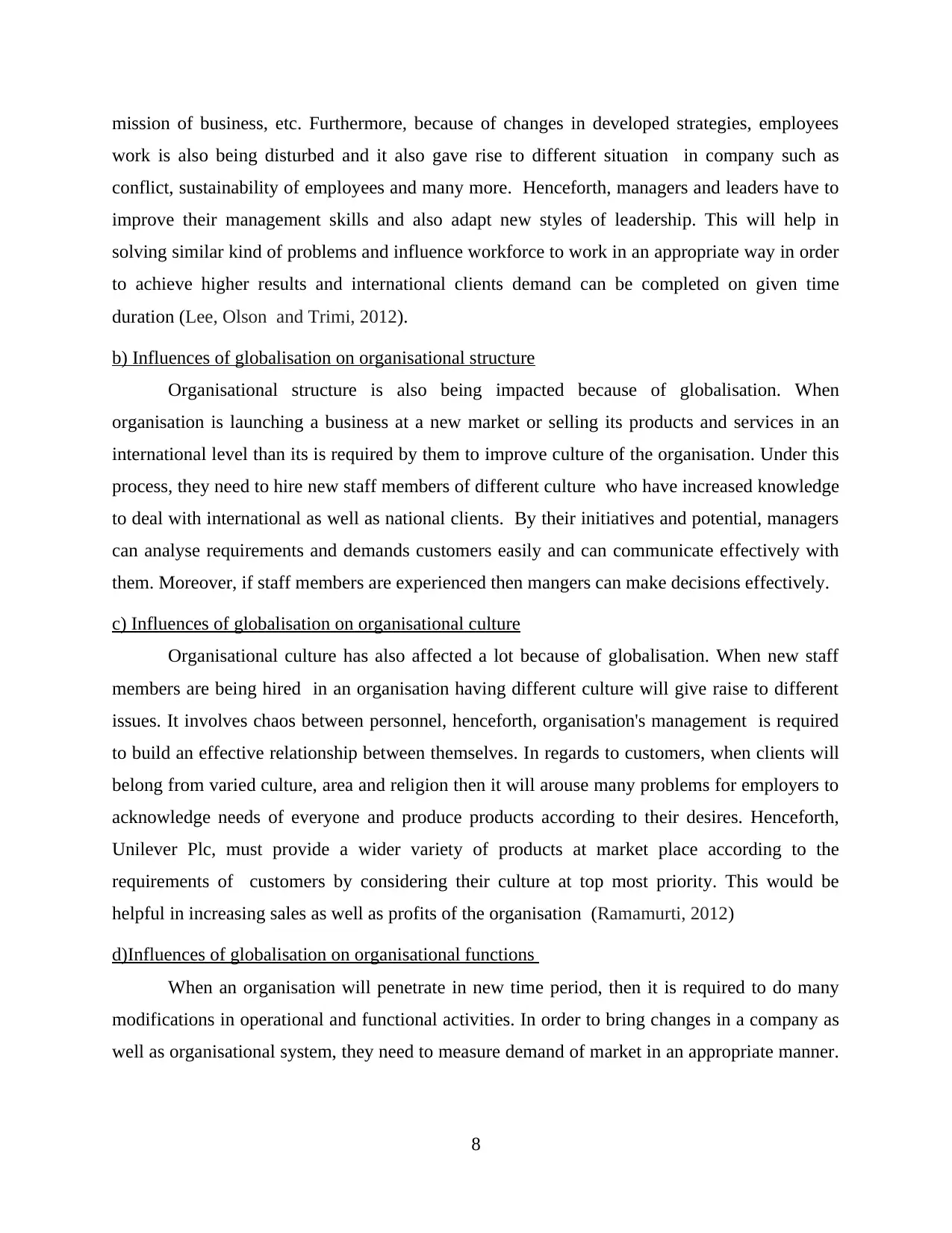
mission of business, etc. Furthermore, because of changes in developed strategies, employees
work is also being disturbed and it also gave rise to different situation in company such as
conflict, sustainability of employees and many more. Henceforth, managers and leaders have to
improve their management skills and also adapt new styles of leadership. This will help in
solving similar kind of problems and influence workforce to work in an appropriate way in order
to achieve higher results and international clients demand can be completed on given time
duration (Lee, Olson and Trimi, 2012).
b) Influences of globalisation on organisational structure
Organisational structure is also being impacted because of globalisation. When
organisation is launching a business at a new market or selling its products and services in an
international level than its is required by them to improve culture of the organisation. Under this
process, they need to hire new staff members of different culture who have increased knowledge
to deal with international as well as national clients. By their initiatives and potential, managers
can analyse requirements and demands customers easily and can communicate effectively with
them. Moreover, if staff members are experienced then mangers can make decisions effectively.
c) Influences of globalisation on organisational culture
Organisational culture has also affected a lot because of globalisation. When new staff
members are being hired in an organisation having different culture will give raise to different
issues. It involves chaos between personnel, henceforth, organisation's management is required
to build an effective relationship between themselves. In regards to customers, when clients will
belong from varied culture, area and religion then it will arouse many problems for employers to
acknowledge needs of everyone and produce products according to their desires. Henceforth,
Unilever Plc, must provide a wider variety of products at market place according to the
requirements of customers by considering their culture at top most priority. This would be
helpful in increasing sales as well as profits of the organisation (Ramamurti, 2012)
d)Influences of globalisation on organisational functions
When an organisation will penetrate in new time period, then it is required to do many
modifications in operational and functional activities. In order to bring changes in a company as
well as organisational system, they need to measure demand of market in an appropriate manner.
8
work is also being disturbed and it also gave rise to different situation in company such as
conflict, sustainability of employees and many more. Henceforth, managers and leaders have to
improve their management skills and also adapt new styles of leadership. This will help in
solving similar kind of problems and influence workforce to work in an appropriate way in order
to achieve higher results and international clients demand can be completed on given time
duration (Lee, Olson and Trimi, 2012).
b) Influences of globalisation on organisational structure
Organisational structure is also being impacted because of globalisation. When
organisation is launching a business at a new market or selling its products and services in an
international level than its is required by them to improve culture of the organisation. Under this
process, they need to hire new staff members of different culture who have increased knowledge
to deal with international as well as national clients. By their initiatives and potential, managers
can analyse requirements and demands customers easily and can communicate effectively with
them. Moreover, if staff members are experienced then mangers can make decisions effectively.
c) Influences of globalisation on organisational culture
Organisational culture has also affected a lot because of globalisation. When new staff
members are being hired in an organisation having different culture will give raise to different
issues. It involves chaos between personnel, henceforth, organisation's management is required
to build an effective relationship between themselves. In regards to customers, when clients will
belong from varied culture, area and religion then it will arouse many problems for employers to
acknowledge needs of everyone and produce products according to their desires. Henceforth,
Unilever Plc, must provide a wider variety of products at market place according to the
requirements of customers by considering their culture at top most priority. This would be
helpful in increasing sales as well as profits of the organisation (Ramamurti, 2012)
d)Influences of globalisation on organisational functions
When an organisation will penetrate in new time period, then it is required to do many
modifications in operational and functional activities. In order to bring changes in a company as
well as organisational system, they need to measure demand of market in an appropriate manner.
8
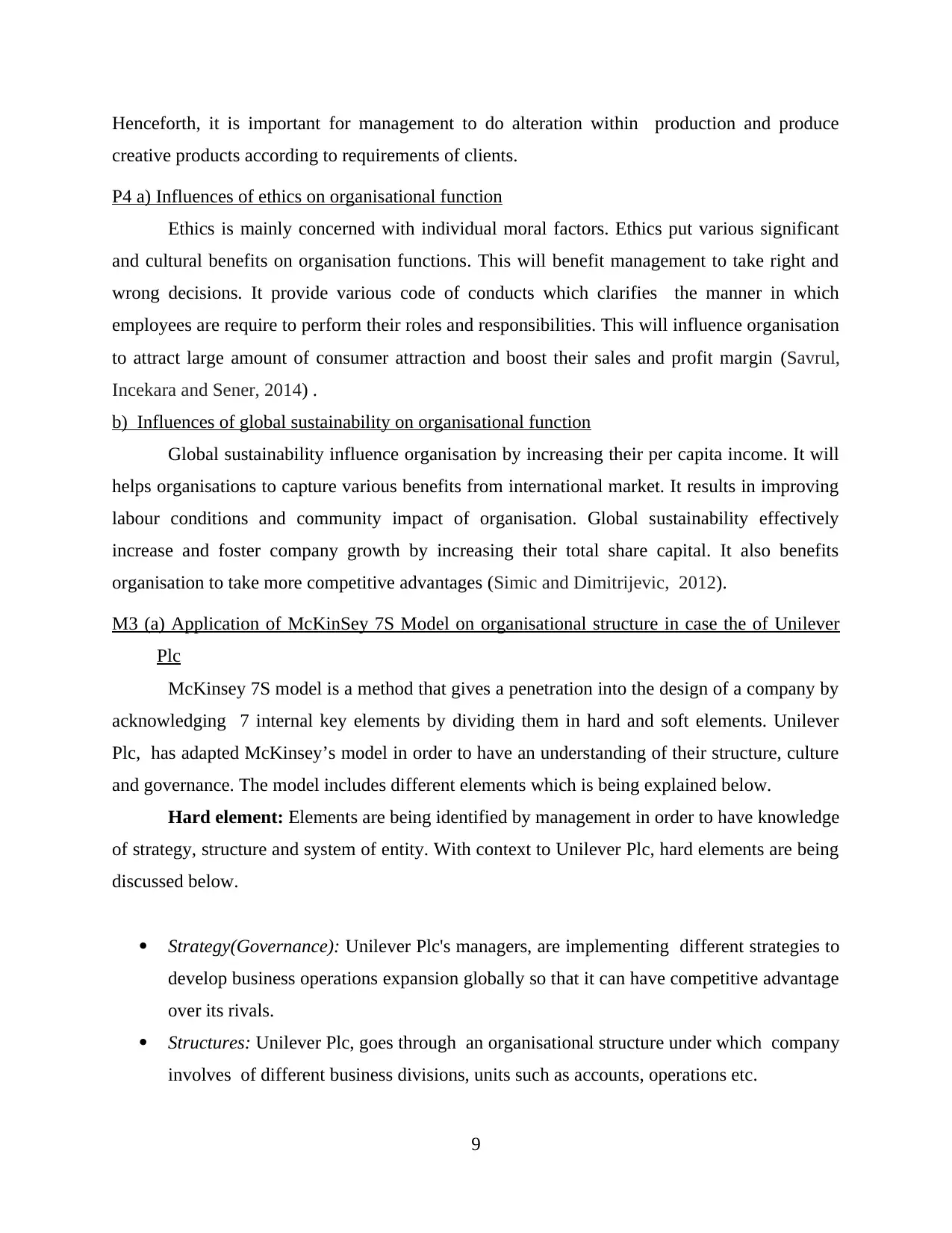
Henceforth, it is important for management to do alteration within production and produce
creative products according to requirements of clients.
P4 a) Influences of ethics on organisational function
Ethics is mainly concerned with individual moral factors. Ethics put various significant
and cultural benefits on organisation functions. This will benefit management to take right and
wrong decisions. It provide various code of conducts which clarifies the manner in which
employees are require to perform their roles and responsibilities. This will influence organisation
to attract large amount of consumer attraction and boost their sales and profit margin (Savrul,
Incekara and Sener, 2014) .
b) Influences of global sustainability on organisational function
Global sustainability influence organisation by increasing their per capita income. It will
helps organisations to capture various benefits from international market. It results in improving
labour conditions and community impact of organisation. Global sustainability effectively
increase and foster company growth by increasing their total share capital. It also benefits
organisation to take more competitive advantages (Simic and Dimitrijevic, 2012).
M3 (a) Application of McKinSey 7S Model on organisational structure in case the of Unilever
Plc
McKinsey 7S model is a method that gives a penetration into the design of a company by
acknowledging 7 internal key elements by dividing them in hard and soft elements. Unilever
Plc, has adapted McKinsey’s model in order to have an understanding of their structure, culture
and governance. The model includes different elements which is being explained below.
Hard element: Elements are being identified by management in order to have knowledge
of strategy, structure and system of entity. With context to Unilever Plc, hard elements are being
discussed below.
Strategy(Governance): Unilever Plc's managers, are implementing different strategies to
develop business operations expansion globally so that it can have competitive advantage
over its rivals.
Structures: Unilever Plc, goes through an organisational structure under which company
involves of different business divisions, units such as accounts, operations etc.
9
creative products according to requirements of clients.
P4 a) Influences of ethics on organisational function
Ethics is mainly concerned with individual moral factors. Ethics put various significant
and cultural benefits on organisation functions. This will benefit management to take right and
wrong decisions. It provide various code of conducts which clarifies the manner in which
employees are require to perform their roles and responsibilities. This will influence organisation
to attract large amount of consumer attraction and boost their sales and profit margin (Savrul,
Incekara and Sener, 2014) .
b) Influences of global sustainability on organisational function
Global sustainability influence organisation by increasing their per capita income. It will
helps organisations to capture various benefits from international market. It results in improving
labour conditions and community impact of organisation. Global sustainability effectively
increase and foster company growth by increasing their total share capital. It also benefits
organisation to take more competitive advantages (Simic and Dimitrijevic, 2012).
M3 (a) Application of McKinSey 7S Model on organisational structure in case the of Unilever
Plc
McKinsey 7S model is a method that gives a penetration into the design of a company by
acknowledging 7 internal key elements by dividing them in hard and soft elements. Unilever
Plc, has adapted McKinsey’s model in order to have an understanding of their structure, culture
and governance. The model includes different elements which is being explained below.
Hard element: Elements are being identified by management in order to have knowledge
of strategy, structure and system of entity. With context to Unilever Plc, hard elements are being
discussed below.
Strategy(Governance): Unilever Plc's managers, are implementing different strategies to
develop business operations expansion globally so that it can have competitive advantage
over its rivals.
Structures: Unilever Plc, goes through an organisational structure under which company
involves of different business divisions, units such as accounts, operations etc.
9
⊘ This is a preview!⊘
Do you want full access?
Subscribe today to unlock all pages.

Trusted by 1+ million students worldwide
1 out of 16
Related Documents
Your All-in-One AI-Powered Toolkit for Academic Success.
+13062052269
info@desklib.com
Available 24*7 on WhatsApp / Email
![[object Object]](/_next/static/media/star-bottom.7253800d.svg)
Unlock your academic potential
Copyright © 2020–2026 A2Z Services. All Rights Reserved. Developed and managed by ZUCOL.




